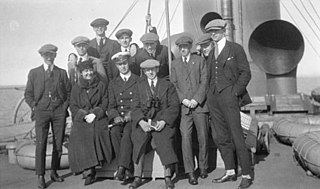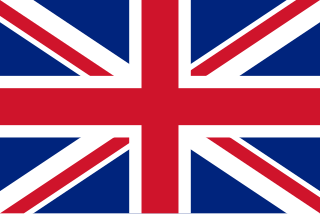
The 1920 Summer Olympics, officially known as the Games of the VII Olympiad and commonly known as Antwerp 1920, were an international multi-sport event held in 1920 in Antwerp, Belgium.

Rugby union has been a men's medal sport at the modern Summer Olympic Games, being played at four of the first seven competitions. The sport debuted at the 1900 Paris games where the gold medal was won by the host nation. It was subsequently featured at the London games in 1908, the Antwerp games in 1920 and the Paris games in 1924.

The field hockey tournament at the 1948 Summer Olympics was the sixth edition of the field hockey event at the Summer Olympics.

The field hockey tournament at the 1936 Summer Olympics was the fifth edition of the field hockey event at the Summer Olympics.

Ice hockey was introduced to the Olympic Games at the 1920 Summer Olympics in Antwerp. The tournament also served as the first World Championships. The matches were played between April 23 and April 29, 1920. Canada, represented by the Winnipeg Falcons, won the gold medal. The silver went to the United States and Czechoslovakia took the bronze.

Ice hockey tournaments have been staged at the Olympic Games since 1920. The men's tournament was introduced at the 1920 Summer Olympics and was transferred permanently to the Winter Olympic Games program in 1924, in France. The women's tournament was first held at the 1998 Winter Olympics.
The equestrian events at the 1920 Summer Olympics in Antwerp included eventing, show jumping, vaulting and dressage. The competitions were held from 6 to 12 September 1920. Although 89 riders were competing, many rode in more than one event, with 87 entries total. Vaulting was also held, its one appearance at an Olympic Games, with only Belgium, France and Sweden fielding teams.

Canada competed at the 1920 Summer Olympics in Antwerp, Belgium. 52 competitors, all men, took part in 38 events in 9 sports. These games marked the introduction of winter sports to the Olympic program ; Canada won its first gold medal for ice hockey.

Rowing at the 1920 Summer Olympics, the first Olympics after World War I, saw five events. The competitions were held from 27 to 29 August in Antwerp, Belgium.

Great Britain, represented by the British Olympic Association (BOA), competed at the 1920 Summer Olympics in Antwerp, Belgium. 234 competitors, 218 men and 16 women, took part in 84 events in 21 sports. British athletes won fourteen gold medals and 43 medals overall, finishing third. It would be the last Olympic Games in which Irish athletes participated for Great Britain, after foundation of Irish Free State in 1922.
The competition of gymnastics at the 1920 Summer Olympics was held from Monday 23 to Friday 27 August 1920 at the Beerschot Stadium in Antwerp. Four events were contested and only men were allowed to compete.

Switzerland competed at the 1920 Summer Olympics in Antwerp, Belgium. 77 competitors, all men, took part in 45 events in 13 sports.

Belgium was the host nation for the 1920 Summer Olympics in Antwerp. 336 competitors, 326 men and 10 women, took part in 121 events in 23 sports.

Denmark competed at the 1920 Summer Olympics in Antwerp, Belgium. 154 competitors, 150 men and 4 women, took part in 66 events in 14 sports.

Spain competed at the 1920 Summer Olympics in Antwerp, Belgium. It was only the second appearance of the nation at the Summer Games, after competing in the 1900 Summer Olympics, but missing the Games in 1904, 1908, and 1912. 58 competitors, all men, took part in 29 events in 7 sports.

Paul Loicq was a Belgian lawyer, businessman and ice hockey player, coach, referee and administrator. He played ice hockey for Belgium men's national ice hockey team and won four bronze medals from in 1910 to 1914. He was a leading supporter of the efforts to introduce ice hockey at the Olympic Games, and served on the organizing committee for ice hockey at the 1920 Summer Olympics. After playing in the 1920 Olympics he served as president of the Royal Belgian Ice Hockey Federation from 1920 to 1935, and as president of the Ligue Internationale de Hockey sur Glace (LIHG) from 1922 to 1947, which was later known as the International Ice Hockey Federation (IIHF). During his time as president the LIHG more than doubled its membership and welcomed the first national associations from Asia and Africa, and the LIHG began hosting its annual Ice Hockey World Championships in 1930. He was also an international ice hockey referee from 1924 to 1937 at the Olympic Games, the Ice Hockey World Championships and the Ice Hockey European Championships. He served in the Belgian Army during World War I and World War II, achieved the rank of colonel, and represented Belgium as legal counsel at the Nuremberg trials.
Fernand Alphonse Marie Frédéric de Montigny was a Belgian fencer and hockey player. He won two silver medals and two bronze in fencing and a bronze in hockey. He was also the architect of the 1920 Olympic Stadium.
Félix Veronique Denayer is a Belgian professional field hockey player who plays as a midfielder for Dragons and the Belgium national team. He played 402 matches for the Belgium national team from 2008 until 2024.

The 1920 Summer Olympics ice hockey rosters consisted of 60 players on 7 national ice hockey teams. Played at the Olympic Games for the first time, and later regarded by the International Ice Hockey Federation (IIHF) as the first World Championship. Teams were required to be strictly amateur, so players from the Canadian-based National Hockey League (NHL) or other professional leagues were excluded. Canada sent the Winnipeg Falcons, who had won the 1920 Allan Cup, the amateur championship in Canada.















